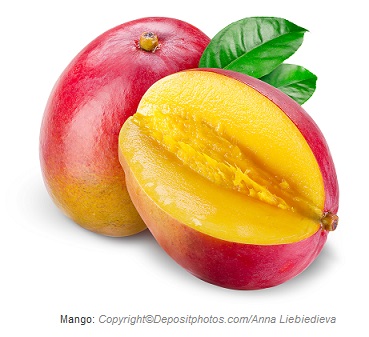Mango is a tropical and subtropical fruit native to south Asia. The fruit varies in size and  color, with a medium mango weighing about 200 grams and providing 35 grams of carbohydrate and 4 grams of fiber. Mango is poor in fat and protein. However, a medium mango contains about 75 mg of Omega-3 and 28 mg of Omega-6 fatty acids.
color, with a medium mango weighing about 200 grams and providing 35 grams of carbohydrate and 4 grams of fiber. Mango is poor in fat and protein. However, a medium mango contains about 75 mg of Omega-3 and 28 mg of Omega-6 fatty acids.
Average calories: 140 per one medium.
|
Mango: one medium |
|
|
Carbohydrate |
35 |
|
Fiber |
4 |
|
Protein |
0 |
|
Fat |
0 |
|
Calories |
140 |
Vitamins found in higher amounts: vitamins C, A, E, K, B6 and B1.
Minerals found in higher amounts: potassium, magnesium and copper.
Phytonutrients found in higher amounts and their health benefits: carotenoids, polyphenols, xanthonoids, and triterpenes are the four phytonutrients found in mangos.
Carotenoids include alpha-carotene, beta-carotene, lutein and zeaxanthin. They are antioxidants that promote healthy eyes and vision.
Polyphenols include quercetin, gallic acid, caffeic acid, tannins, catechins and kampferol. They have anti-oxidative, anti-inflammatory, anti-allergic and anti-cancer properties.
Mangiferin and euxanthin are the xanthoniods found in mangos. Mangiferin has anti-oxidative and antibacterial activities. Some studies suggest that it may lower blood sugar level.
The only triterpene found in mango is called lupeol, which has anti-inflammatory, antibacterial and anti-cancer activities (especially against prostate and skin cancers) .

